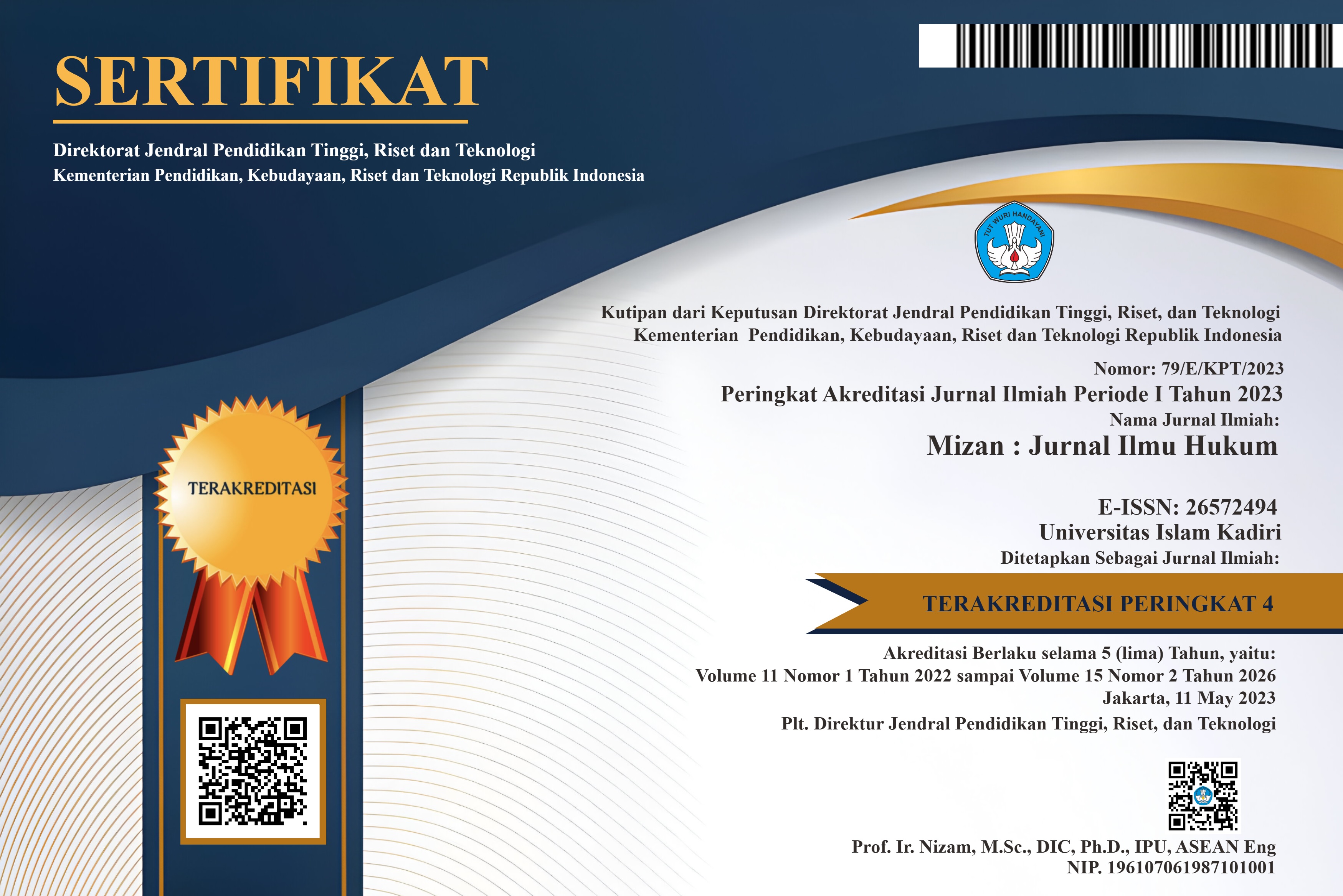KAJIAN YURIDIS TERHADAP PUTUSAN PERKARA CERAI GUGAT TERKAIT DENGAN PEMENUHAN HAK ISTRI PASCA PERCERAIAN DI PENGADILAN AGAMA (Perbandingan Putusan No. 575/Pdt.G/2021/PA.Kdr dan Putusan No. 97/Pdt.G/2020/PA.Mtp)
Abstract
SEMA No. 2 of 2019 which accommodates PERMA No. 3 of 2017 concerning guidelines for trying cases of women dealing with the law makes new legal protection for women seeking justice, including divorced wives. Where the contents of the SEMA and PERMA allow a divorced wife to be sued to ask for her post-divorce rights, one of which is maintenance Iddah and sustenance mut'ah. However, in practice, in several Religious Courts the panels of judges still have differences in the legal considerations used regarding the burden of living Iddah and sustenance mut'ah. As for the focus of this research, namely examining the rights of the wife who filed for divorce and the considerations of the panel of judges regarding the decision of the divorce case, claim No. 575/Pdt.G/2021/PA.Kdr and case No. 97/Pdt.G/2020/PA.Mtp when viewed from SEMA No.2 of 2019.
This study uses a type of normative legal research using statutory approaches, case approaches, and comparative approaches in analyzing legal issues. The technique of collecting legal materials in this study was carried out by means of inventorying legal materials, identifying legal discussion, classifying legal materials, systematizing legal materials, and interpreting legal materials. Furthermore, documents in the form of court decisions are analyzed using descriptive analysis techniques using deductive legal reasoning or legal syllogisms.
The results of this study can be concluded as follows: First, a wife who in this case is dealing with the law after a divorce, a wife has rights which can be requested from her ex-husband, these rights are contained in KHI 149, namely:Mut'ah, Nakah Iddah, Dowry Owed, Hadhanah fees for children. Second, In the decision of matter No. 575/Pdt.G/2021/PA.Kdr and matter No. 97/Pdt.G/2020/PA.Mtp there is a difference in the warning the decision handed down by the Panel of Judges regarding the imposition of living rights Iddah and sustenance mut'ah. In case decision No. 575/Pdt.G/2021/PA.Kdr, the Panel of Judges decided that the Plaintiff was not entitled to a living Iddah and sustenance mut'ah. Because in the consideration of the panel of judges only referred to KHI. Meanwhile in case No. 97/Pdt.G/2020/PA.Mtp The Panel of Judges decided that the Plaintiff is entitled to these rights. Because in their consideration the Panel of Judges has applied the rules in SEMA No. 2 of 2019.
References
Taufiq Fatur, Rouzie Saragih and Adlin Budhiawan, “Hukum Nafkah Mut’ah Dan Iddah Istri Dalam Perkara Khuluk (Analisis Terhadap Sema No.3 Tahun 2018 tentang Pemberian Nafkah Idah Dan Mut’ah Pada Perkara Cerai Gugat),†Jurnal Hukum Islam dan Pranata Sosial Islam 10, no. 01 (2021).
Mukti Arto, Praktek Perkara Perdata pada Pengadilan Agama, (Yogyakarta: Pustaka Pelajar, 2005).
Kompilasi Hukum Islam, Buku I Hukum Perkawinan, Bab XVII Akibat Putusnya Perkawinan, Bagian Kesatu Akibat Talak, pasal 149.
Zainuddin Ali, Metode Penelitian Hukum, Cet. 3, (Jakarta: Sinar Frafika, 2011).
H. Zainuddin Ali, Hukum Perdata Islam di Indonesia (Jakarta: Pustaka Amani, 2002).
Mohd. Idris Ramulyo, Hukum Perkawinan Islam (Jakarta: Bumi Aksara, 1996).
Kompilasi Hukum Islam, Buku I Hukum Perkawinan, Bab XVII Akibat Putusnya Perkawinan Bagian Kesatu Akibat Talak, Pasal 149.
Kaharuddin, Nilai-nilai Filosofi Perkawinan (Jakarta: Mitra Wacana Media, 2015).
Zainudin Ali, Hukum Perdata Islam di Indonesia, Cet 3 (Jakarta: Sinar Grafika, 2009).
Kompilasi Hukum Islam, Buku I Hukum Perkawinan, Bab XVII Akibat Putusnya Perkawinan Bagian Ketiga Akibat Perceraian, Pasal 156.
Taufiq Fatur, Rouzie Saragih and Adlin Budhiawan, “Hukum Nafkah Mut’ah Dan Iddah Istri Dalam Perkara Khuluk (Analisis Terhadap Sema No.3 Tahun 2018 tentang Pemberian Nafkah Idah Dan Mut’ah Pada Perkara Cerai Gugat),†Jurnal Hukum Islam dan Pranata Sosial Islam 10, no. 01 (2021).
Irwan Adi Cahyadi, Kedudukan Surat Edaran Mahkamah Agung (SEMA) dalam Hukum Positif di Indonesia (Malang: Universitas Brawijaya, 2014).









